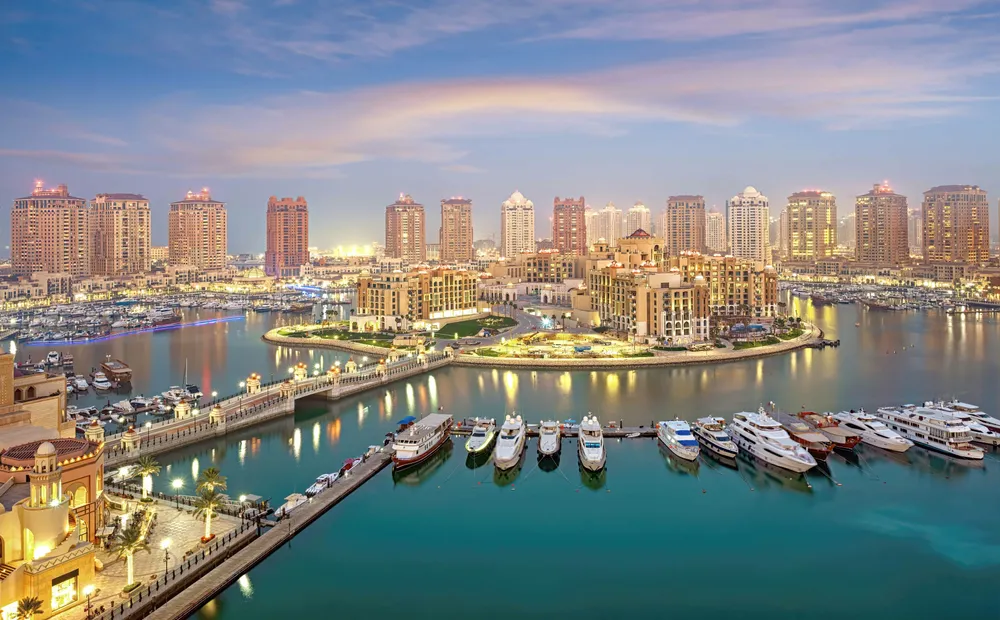Qatar's World Cup scandals
- Sebastian Palacios.

- Nov 20, 2022
- 6 min read
Updated: Nov 21, 2022
According to many ways of measuring real GDP per capita, Qatar, located in the Arabian Peninsula, has been among the top 5 richest countries in the world during the last 15 years. This is because the country has the 3rd and 13th biggest gas and oil reserves respectively on the earth, but with only 2.6 million inhabitants, of which just 320,000 are Qatari citizens and the rest mostly low-paid immigrants from South Asia.
In the late XIX century, the British Empire helped the local tribes to fight against Ottoman rule, and an agreement was finally reached in 1916 with Arab emirs to make Qatar a protectorate (colony) of the U.K. The first oil reserves were discovered in 1939 but the U.K. decided to withdraw from the region amid the global decolonization movements of post-WW2, and Qatar finally became independent in 1971.
The connection with western powers remained good as Qatari oil and gas fields allowed 49% of foreign investment participation and the country served as a military ally for NATO in the Persian Gulf. Qatar has been controlled by the Thani family since 1868, and ruled as a hereditary monarchy since the independence of 1971. The emir has almost full authority over legislative and judiciary powers; freedom of press and association are severely limited, and women need the approval of male guardians to seek a job, drive, travel abroad, and engage in major social events.
In 2017, Saudi Arabia, the United Arab Emirates, Bahrain and Egypt broke diplomatic relations with Qatar and Saudi Arabia blocked the country's only land crossing. The Saudi-led coalition accused Qatar of financing pro-Irani terrorism in the Gulf States including the Taliban insurgency in Afghanistan, but the crisis ended in January 2021 following a resolution between Saudi Arabia and Qatar. With the war in Ukraine, Qatar has been a major Western partner in delivering Liquid Gas to Europe to replace Russia. Even further, the Biden administration designed Qatar as "a major non-NATO ally".
But, Qatar made the big headlines internationally when it won in 2010 the bid for hosting the 2022 Men's World Cup of football that will start this Sunday. Qatar will be the first Muslim country in doing it, the smallest one to have ever hosted an event like this so far, having only one big stadium at the moment of presenting its bid, and zero appearances in a World Cup. The way this Gulf state won the bid has been highly controversial:
•In early 2010, just before the 2018 and 2022 World Cup tournaments were awarded, the Confederation of African Football (CAF) held its annual general meeting in Libya. Qatar sponsored the congress and in return, the Gulf state was allowed to present its World Cup bid to the African delegates that had a vote on FIFA’s Executive Committee. It was the first time that the CAF congress excluded all the rest of bidding nations (USA, Australia, South Korea and Japan) from being present, and at the same time offered its forum to only one nation. Phaedra Almajid, who was in charge of international press for Qatar bid team, claims that Africa's 3 officials of football's highest organization body, FIFA, got $1.5 million for their vote. She retracted her claims, but later said that she did that under threats.
•Former FIFA president Sepp Blatter said the decision to award the 2022 World Cup to Qatar was a "mistake", that he voted for the US to host the World Cup, and that European FIFA officials were persuaded by the region president, Michel Platini, to vote for Qatar. This after former French president Nicolas Sarkozy had a meeting at his official residence in Paris with them and the crown prince of Qatar, now the Emir, Sheikh Tamim bin Hamad Al Thanione, one week before the final voting in December 2010. Blatter said that "thanks to the four votes of Platini and his European team, the World Cup went to Qatar rather than the United States. It's the truth", regarding the 14-8 voting result.
•In March 2014, it was revealed that former FIFA's president in Central and North America, Jack Warner, was paid almost $2 million from a firm linked to Qatar's successful bid campaign. FIFA ordered a lengthy investigation into these allegations and a report cleared Qatar of any wrongdoing.
•In 2015, the Swiss department of Justice raided the headquarters of FIFA and several officials were arrested for bribes of more than $150 million. Blatter spent 17 years as FIFA president but was forced to resign in 2015 over allegations he transferred $2.2 million to Platini, who was also forced to resign after that. Both were charged for fraud, but were found innocent in a trial in Switzerland in July 2022.
In order to host a tournament with 1.5 million expected visitors, a new metro system was developed, 100 new hotels erected, seven new stadiums constructed and one completely renovated, and shuttle flights from neighboring Dubai, Iran and Bahrain will be available each day. When the tournament is finished, six of the stadiums will have about half their seats taken up and sent to developing countries, while a seventh will be completely dismantled and only one will remain untouched. As for the hotels, many will be transformed into school facilities, cultural buildings and offices.
Because daytime temperatures in the summer can reach 50 °C, and the 2022 Winter Olympics of Beijing were celebrated in February, it was decided to play the tournament in November-December, when maximum temperatures are around 27 °C. Some other social controversial issues around Qatar organizing the World Cup are:
•Homosexual acts are illegal in Qatar because they are considered immoral under Islamic Sharia law. Punishments include fines, prison sentences of up to seven years, and sometimes death by stoning. Despite government officials labeling this sexual orientation as a "mental illness", Qatar has given assurance that "everyone is welcome to attend the World Cup, inclusive gay people, but it is expected from the visitors to show respect for the local laws".
•Alcohol is prohibited in all places except in exclusive hotels, selected bars that charge 50 dollars entrance fees and 15 for each glass of beer, and 'fan zones'. In the end, Qatar did not allow selling alcoholic beverages inside the stadiums, so the official sponsor, Budweiser, is expected to sue FIFA for economic damage.
•According to British media, and based on the records of Embassies in the capital Doha, around 8,000 migrant workers, mainly from Bangladesh, Pakistan, India, Sri Lanka, Nepal and Kenya, have died in cases related to the construction of World Cup infrastructure. The government of Qatar says that the real number is around 40, and that the 8,000 figure comes from all the population from those countries that was resident and died of 'natural causes', which would match expectations based on population-wide mortality rates. The truth is, however, that the mortality rate of those citizens living in Qatar is almost 3 times higher than in any other country, so it is very unlikely that those migrant deaths were not related to working conditions, especially for building World Cup infrastructure.
•Until 2017, Qatar had a labor system called "Kafala" (Arabic word meaning sponsorship) that tied migrant workers to their employer by requiring them to have the company’s permission to leave the country and their passports were confiscated when arriving at the airport. Also, migrant workers paid around 1,000 dollars of recruitment fees. Typically, migrants from South Asia worked 12 hours per day to build World Cup facilities to earn less than 300 dollars per month, which is twice as much the average they earn in their home countries. After many pressures from Western media, FIFA, and International Labor Organization, Qatar has improved on its labor legislation:
•Migrant workers can change of employer, even if in practice companies collude to make it very difficult for workers to switch.
•Currently, outdoor working in the summer months, when maximum temperatures average 43 °C, is not allowed anymore between 10:30 a.m and 3:30 p.m.
•A minimum wage of 300 dollars per month has been introduced, and food and drinks must be provided by companies, or added to the salary.
•Companies can not withhold salaries anymore to punish workers, which is a sort of forced labor.
It is true that it is highly controversial that a dictatorship like Qatar got to host the World Cup, but it is not the first time this has happened: Italy 1934, Argentina 1978, Spain 1982, Mexico 1986, and Russia 2018, all had very authoritarian governments when they won the bid or hosted the tournament. Also, since those measures were enacted in 2017, migrant's mortality rate has been reduced substantially and democracy in the country slightely improved.













Comments